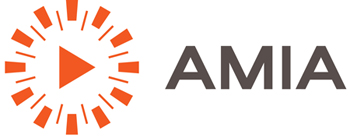Program Stream: Stewardship of Indigenous Materials
LIVE STREAMING ON SATURDAY, NOVEMBER 16TH
SEE IT HERE: STARTING AT 9:30AM
Stewardship of Indigenous Materials in AV Archives
Indigenous and tribal communities around the world are taking steps to reaffirm control over the images and sounds of their communities, but many materials remain in archives, museums, and libraries outside of tribal communities and non-tribal archivists are stewards of these materials. This program stream, in collaboration with the Association of Tribal Archives Libraries and Museums will offer collaborative methods, technologies, tools, and workflows to ethically preserve and provide access to indigenous audiovisual heritage materials. The stream will feature five sessions. The stream is funded by a contract with the Council on Library and Information Resources (CLIR), with funds provided by the National Film Preservation Board.

9:30 AM – 10:30 AM
From Time Immemorial: Centering Indigenous Knowledge in Archival Practice
Jennifer R. O’Neal, University of Oregon
Michael Pahn, National Museum of the American Indian Archive Center
This presentation will examine the traditional Indigenous knowledge systems that are at the center of Native American lifeways and culture. We argue that it is imperative that these traditional knowledge systems must be the foundation for the overall care and management of Indigenous archives in non-tribal repositories. Further, we show that applying a decolonizing practice approach will ensure that Indigenous ways of knowing will be centered in the stewardship of collections. Examples of how this work can and should be implemented in repositories are presented to show specific examples and as a call to action.
11:00 AM – 12:00 PM
What Can We Do? Community Archiving Workshop and the Role of Professional Associations for Tribal Archives
Sandra Yates, Texas Medical Center Library
Amanda Castro, Malki Museum
Aaron Saubel, Malki Museum
Open call for roundtable participant
With the support of AMIA, the Community Archiving Workshop (CAW) has conducted workshops at the annual conference of the Association of Tribal Archives, Libraries, & Museums (ATALM) for the last two years. At the 2019 ATALM conference in Temecula, CA, Malki Museum from Banning, CA was the workshop’s feature collection. The session will summarize the activities of the day-long workshop that took place on October 8th. Amanda Castro, Malki Museum Director, will talk about the museum’s background as “California’s First Museum Founded by Native Americans,” its collections, and its involvement at the ATALM workshop. Other stewards of tribal archives will begin a roundtable discussion about the role of professional associations, like AMIA and ATALM, in supporting tribal archives in the preservation and access of their materials for their communities
2:00pm – 3:00pm
Tribesourcing Midcentury Educational Films: Digital Repatriation and Local Knowledge
Jennifer Jenkins, University of Arizona
Rhiannon Sorrell, Diné College
Melissa Dollman, University of North Carolina
Crystal Littleben, Navajo Cultural Arts Program
In this NEH-funded digital humanities project, we take midcentury educational films back into Indian Country where they were made in the 1940s through 60s and record new narrations by community members and elders from the insider point of view. This “”tribesourcing”” method allows for identification of local knowledge that might otherwise be lost, as well as providing a rich, community-based metadata record for each film. We will demonstrate the merging of old video and new audio in Mukurtu, and discuss what we have learned in the process of digitally repatriating these midcentury films. We’ll show examples of “before” and “after,” and discuss the collaborative process with tribal partners.
3:30pm – 4:30pm
The Work of Indigenous Knowledge in the Age of Digital Reproduction: Some Notes on Relationships
Guha Shankar, Library of Congress
This presentation looks at the historical production and contemporary re-reproduction of indigenous cultural expressions through a case study of the Ancestral Voices project, a joint initiative of the Passamaquoddy Indian nation, the American Folklife Center at the Library of Congress and the digital tools, Mukurtu CMS and the Traditional Knowledge attribution labels. The presentation will take a detailed look at the ways in which digital tools and platforms are deployed in the preservation of and access to archival media to assist indigenous peoples in sustaining historical memory and strengthening the use and practice of imperiled lifeways within communities. The presentation also highlights the ways in which personal and professional relationships are critical in determining the shape and structure of such initiatives.
4:45pm – 5:45pm
Indigitization: Supporting the Digital Preservation of Indigenous Cultural Heritage Where It Lives
Gerry Lawson, University of British Columbia
